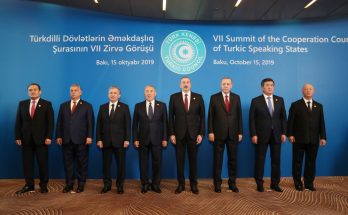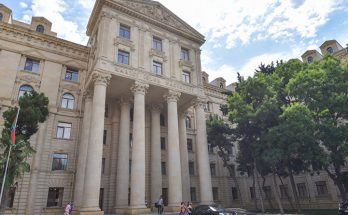
Despite ancient traditions of the statehood, Azerbaijan is a young country, and in the past two decades we have managed to transform our country into a modern state, head of Political Analysis and Information Supply Department of the Administration of the President of Azerbaijan Elnur Aslanov said at Baku Futures Forum today. “In recent years Azerbaijan has turned into a venue of global forums for discussing pressing international issues, including World Economic Forum’s Strategic Dialogue on the Future of the South Caucasus and Central Asia; Club de Madrid forum in the Caucasus, and, of course, the 2nd World Forum on Intercultural Dialogue,” he said.
The Presidential Administration’s official believes that this stems from growing significance and role of the country in the region and the world.
“Azerbaijan is one of the unique places where different cultures and civilizations meet at the crossroad between the East and the West, the North and the South,” he added.
According to Aslanov, being a member of both Islamic and European organizations Azerbaijan absorbs the values of both civilizations.
“This enables us to assume a role of a center of geopolitical, geo-strategic and geo-economic importance in Eurasia,” he said.
He noted that besides rich culture, ancient history and traditions, Azerbaijan is widely known for its oil and natural gas.
“After we regained our independence in 1991, Azerbaijan pioneered development of the Caspian energy resources and their integration in European energy security infrastructures,” he said.
Aslanov recalled that it was the National Leader Heydar Aliyev who secured the largest single foreign investment in the former Soviet Union – an oil contract, which later became known as the “Contract of the Century”, and thanks to him Baku-Tbilisi-Ceyhan oil pipeline became the most significant infrastructure project in the region, delivering oil from the Caspian Sea to the open ocean.
He noted that all these long term projects, including Baku-Tbilisi-Erzurum gas pipeline and the Baku-Tbilisi-Kars railway projects, and Trans-Anatolian gas pipeline-TANAP have a great importance for ensuring Europe’s energy security.
“Yet, unfortunately, unresolved conflicts represent a long-term challenge to our efforts to promote prosperity, security and stability in the whole Euro-Atlantic area,” Aslanov noted.
Further speaking about the unresolved Nagorno-Karabakh conflict, Aslanov stated that despite ongoing political efforts towards the earliest resolution of the Armenia-Azerbaijan conflict, activities in the occupied areas of Azerbaijan are in gross violation of international law.
“April of this year marked the 20th anniversary of the first UN Security Council resolution on the Armenia-Azerbaijan conflict-UNSC Resolution 822. But Armenia never complied with neither with this, or with following three UNSC resolutions pertaining to the conflict. While the world is silent regarding this issue, Armenia uses their silent support to further consolidate of the status-quo of occupation,” he said.
Aslanov noted that Azerbaijan’s strategy is aimed at the liberation of all occupied territories, the return of forcibly displaced population to their homes, and the establishment of long-lasting peace and stability in the entire South Caucasus.




